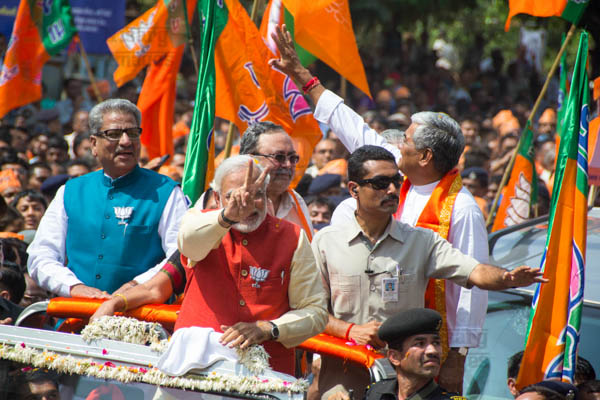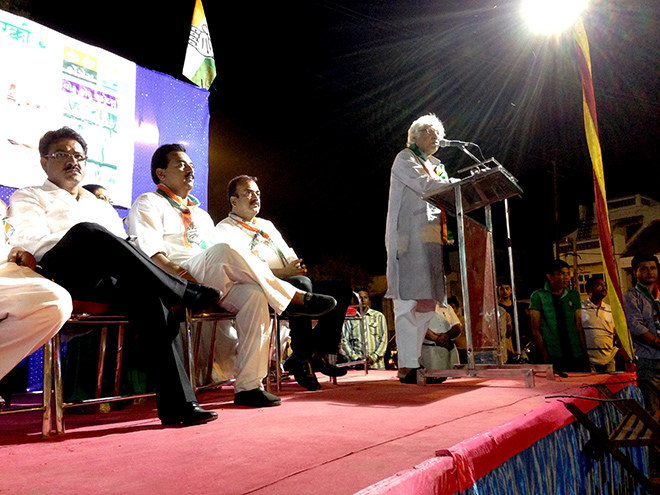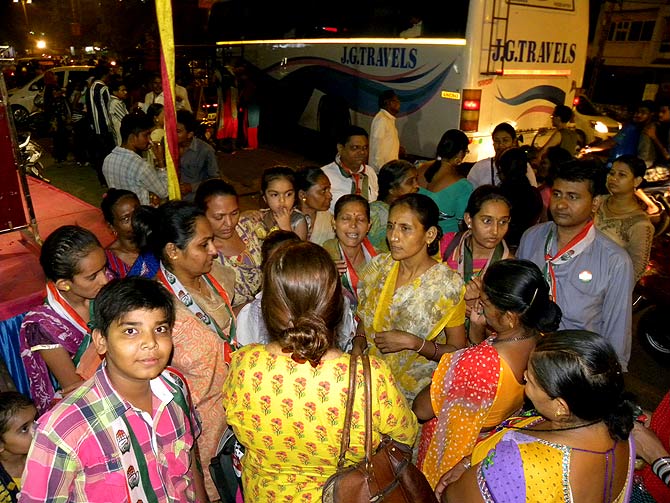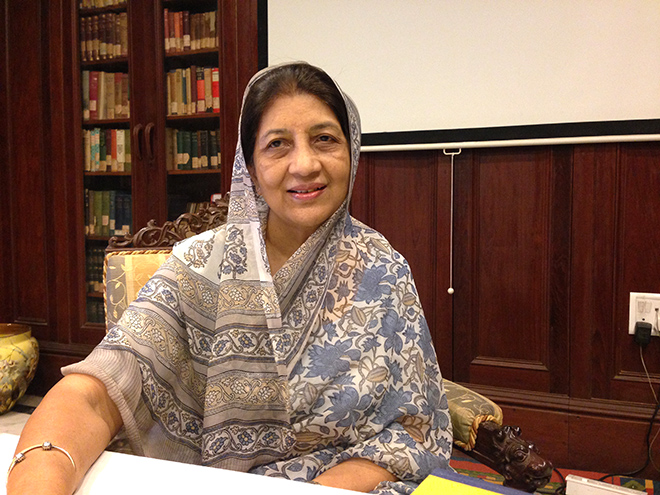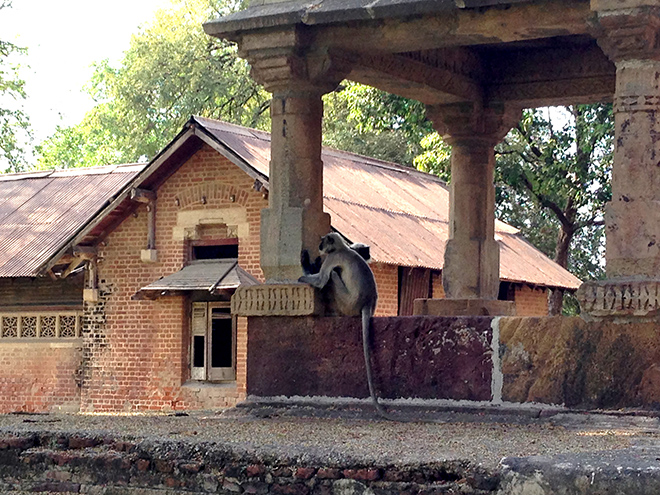As the long and punishing polling for the 16th Lok Sabha elections ended with the grand finale of Varanasi in Uttar Pradesh, where BJP prime ministerial candidate Narendra Modi is fighting a historic battle, Rediff.com‘s Vaihayasi P Daniel and Project India‘s Patrick Ward joined hands to offer a view of Baroda, Modi’s second constituency. Here, in this safe seat from Gujarat, his victory is seen as a done deal — despite scars of the 2002 riots among the minority Muslim population.
The first thing that struck us about Baroda was the quiet. Sure, the city was plastered with election posters. Posters that brandished a finger, admonishing you to vote for Narendra Modi. Posters and posters and posters. They were on every wall, underpass, and bridge, crowding out the billboards of Congress leader Rahul Gandhi, submerging him in a cacophony of silent Modi-figures with tough Modi-glares glinting through steely Modi-glasses.
But one thing was missing. There was no noise.
A few days before the polling day when we visited Baroda, Modi’s ‘home’ constituency in Gujarat, there was no real election buzz. That intangible election energy, which hangs in the air when you enter every Indian town about to vote, that was absent.
At the Bharatiya Janata Party’s central office in Sayajiganj, just before sundown two days before campaigning was to end, a solitary Modi-vehicle, with a nearly life-size cutout of Modi’s head fronting its bonnet, was parked outside. Devotional music spilled robustly out of its speakers into the lobby.
Bharat Dangar, the BJP president for Baroda City, sat at a broad desk, a lotus pinned to his chest. There were saffron rubber bands on his desk, and he was to later say they handed out saffron hairbands as well (saffron being the BJP’s official colour).
The faces of Modi and other BJP politicians formed a panorama behind Dangar, affording him some additional heads, like a Hindu deity. He had all the constituency facts at his fingertips and could reel out pretty much any statistics you asked for. He brimmed with confidence and self-satisfaction. As far as Dangar was concerned, the constituency was already won. There was no need for May 16. Modi was well on his way to 7, Race Course Road.
“Everyone knows Modiji will win with a big margin. We want to create a history over here,” Dangar said. “This is the first chance a Gujarati, as a Barodian, will vote for the PM and not [just] for the MP. We have 543 constituencies in India. Among the 543 only Varanasi and Baroda will vote for the PM. We are the lucky ones… After the fifth or sixth phase it was clear, very clear that the BJP will come in the power, NDA [the National Democratic Alliance] will come in the power. And Narendra Modi will become the prime minister of the India.”
Modi had stopped by in Baroda for a large rally on April 24, for just four hours, from 8 am to 12 noon. That was all Baroda saw of Modi. Such was the confidence the BJP claimed to have in Baroda that Dangar said he was certain of a significant win.
“Everyone here is Narendra Modi.” Dangar said. “He himself said that at our public meeting. Everyone here is a Narendra Modi. Why should I take stress because everyone here is a Narendra Modi? Not by birth. But by their work.”
By that logic, Baroda, a city if 1.637 million, is a city of 1.637 million Modis. And every single one of those 1.637 million Modis would vote for Modi. That sounds like good electioneering, and you cannot but admit that Modi and his campaign advisors know how to play the crowd.
Dangar was quick to agree there was not much electoral buzz in Baroda — not too many rallies, not too “much voices or noise”. What was not evident to the casual observer, he pointed out, was the extensive door-to-door and meeting-based campaigning the BJP was undertaking — particularly in rural areas, which account for some 500,000 voters.
Most of their work was volunteer-driven, Dangar said. The BJP has 10,000 registered workers in Baroda and many more volunteers, and the main strategy had been to pay special attention to the electoral list, which runs to 25,000 pages, with between 45 and 48 voter names – roughly 10-12 families – per page. For each page, one resident had been chosen ‘Page President’, Dangar said, and it was his/her job to mobilise the others listed on the page to vote for Modi.
So how many Page Presidents did he have in all?
“Twenty-five thousand!” Dangar said, with evident glee.
If there was a spark of electioneering activity visible a few days before polling, it was at the Congress candidate’s rallies. Taking on Modi in a constituency where it is predicted he will triumph with a margin never seen before is all about guts and no glory. And Madhusudan Mistry came across exactly as that kind of feisty fighter as he addressed shockingly tiny rallies — a hyperactive stage actor without an audience. He matched the smug BJP hyperbole word for word.
It must be a very tough fight for him. Why did he take it up?
“Why not?” said Mistry, who sported a mop of long white hair. “When Enoch Powell [the British politician notorious for his controversial Rivers of Blood speech against immigration] contested in Britain, somebody took him on as well. He lost. But they fought.”
So it is because somebody has to stop Modi?
“Yes. Someone has to expose him,” Mistry said. “What sort of person he is. What his development model is. I would say it is purely a facade. He talks about development. In the back of his mind is a very clear-cut vertical divide that he wants to inject between Hindus and Muslims.
“If he ever gets elected and if he ever becomes the prime minister, the first thing he will do is declare a war with Pakistan, to get himself established as a hero in the Indian psyche. His rhetoric against the Muslims and the minorities will continue.”
What is the best change Modi has brought to the state? Mistry shrugged.
“Tell me, in which sector is Gujarat leading the country?” he challenged. “Tell me one. Manufacturing, services, industry, agriculture, health, education? Which sector? IT? Name one?”
Mistry is a mean speaker, and not without talent. He continuously attempted to fire up the audience at the Vagodia area in Savli. But still it was at best a dull show.
The audience sat collapsed in white plastic chairs, listening, but largely unresponsive. The rally, which took place on the side of a main road, caused the traffic to pause only occasionally. Now and then someone would stop by on their motor scooter to listen for a few minutes, before losing interest and carrying on. Once in a while passers-by yelled a jibe: “We have had enough of Congress.”
A group of women at the front of the rally pushed forward and surrounded us when we said we were journalists. They begged us to visit their homes and see their plight.
“Why would I not vote for the Congress? They look out for the poor! Modi cannot even look after his wife,” said Neelu, a factory worker, referring to the recent controversy about Modi abandoning his wife for politics.
Geeta Rajput, from Vaghodia, who washes dishes for a living, lives in one of the government-built housing projects that have slowly started replacing the city’s original slums. She was upset her home leaked water, and she could get no city official to solve the problem.
It was about 9 pm. From Vagodia, Mistry headed to a rally at Raopura, an area where he believed he had good support. Raopura voted in a BJP legislator in the last assembly election; it is mixed area of Gujaratis, Uttar Pradesh migrants, Baroda Maharashtrians, and Dalits.
The audience in Raopura was larger, more attentive to Mistry – but still not enthused. If one were to try to gauge the audience reaction it would seem they were here to judge if Mistry might make a better alternative.
Chaya Rajput, 33, a housewife who sat listening to Mistry at the back of the rally said, “At my in-law’s place all of us like Modi. We like the work he has done very much. I have no fear [that he will bring divisive politics]. Ever since I have grown up and matured I have been seeing his government.”
Rajput said her family liked what Modi had done in the state, especially with respect to education, roads, water, electricity. For her the deciding factor was contrast she saw between Maharashtra and Gujarat, when she went to visit her sister in Shahada, Maharashtra, across the border from Gujarat.
“There is no light there,” Rajput said. “The roads are so dark. But when you reach the Gujarat border, it is all light.”
Mistry said he worked hard trying to attract disaffected voters to his cause. “You just have to go on talking to the people. Be with them, explain to them, mobilise them.”
What does he like least about Modi?
Mistry laughed as he mulled over that question. “I don’t know!” he finally said. “I have never answered this sort of question before…”
Then he added, “He never tell you the truth. He is a five-step liar. He will tell one lie to a subordinate. And then he will convey it to one person. Then he will convey it to the fourth person. The fifth person will go out and tell. And from where it originates nobody knows.”
The poor, be they hawkers or workers, according to Mistry, are still drawn to the Congress because the Modi Dream is not one they feel they can realise.
“It depends on what sort of person you talk and interview with. If they are people who are doing a little well economically they will naturally be siding with him. This has been the history of Gujarat. Wherever there was a good economic status we always supported the right wing people.”
“We never supported the African National Congress in South Africa or a Labour Party in Britain or Labour in Australia. We are always with the Tories and in the US as well. This has been the psyche in the state with whoever is outside. Mainly those who have money will always be siding BJP.”
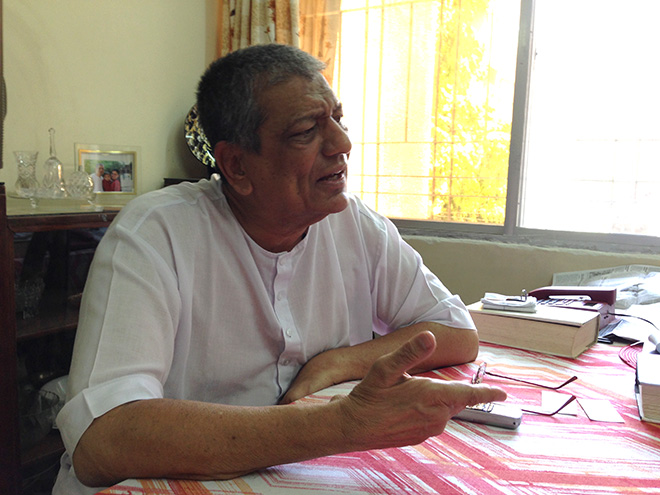
Why did Modi choose Baroda — with 11,539,68 male voters, 10,717,95 female voters and 34 other voters, as per the latest Gujarat census figures — as his constituency?
Professor J S Bandukwala, a human rights activist who narrowly escaped death when rioters burnt down his in 2002, said: “He chose Baroda because this is the most BJP-oriented constituency in Gujarat.”
Because of the RSS impact from its headquarters in central Maharashtra?
“Not only the RSS impact. The impact of people abroad. This is the Patel-Patidar area and every family has someone abroad. There is a very large population in America and they are very fanatical, most of the Patels. This is their centre. They are all settled in New Jersey and other areas. This is the one constituency he doesn’t have to bother about.”
If Modi wins both Varanasi and Baroda, will he step down from the latter constituency? We asked Dangar that, but he refused to answer.
“Our aim is to make a historical victory,” he said.
Modi will most likely triumph in Baroda, but will the industrious 25,000 Page Pramukhs succeed in bringing some of the city’s approximately 300,000 Muslims to vote saffron? Javed, a taxi driver who took us around, thought so.
“The riots took place in 2002. Things have changed since then,” he said. “Modi has found a place in our hearts. He has brought progress. He has provided jobs.”
Bandukwala, who has a daughter and son settled in the US, and a Hindu Gujarati son-in-law, had this to say of Modi:
“Many Muslims have become resigned to him. They will just accept him for whatever he is. Which I can understand. Small people in public cannot say anything, for fear that there may be a reaction.”
He continued, “Muslims are in a real trap just now. There is an intense fear also. If you go below the surface you will find an uneasiness. We don’t know what is going to happen. We don’t know. That fear is very deep. Society is completely communalised and divided. I don’t know where we will be headed.”
Baroda has a scarred history. Though some of the worst incidents of the 2002 Gujarat riots that saw about 1,500 casualties took place 111 km away in Ahmedabad, Baroda too witnessed deaths – some 36 people were killed in the ensuing violence in the city. Its proximity to Godhra also meant that scores of Muslims fled to Baroda. There was more Hindu-Muslim violence in 2006. But is it possible that BJP might have gained some Muslim voters who are willing to put 2002 behind them?
Mistry said, “In the constituency I was representing, I don’t think they have put it behind.”
As we travelled through rural Gujarat the next day, we quizzed Muslim voters about their preference. The much-touted Gujarat model of Narendra Modi seemed to not have percolated these areas; and despite what Dangar claimed, many Muslims among the 1.637 million voters of Baroda were not Modis, but anti-Modis.
Bandukwala’s words seemed to acquire a ring of truth as we left our last interviewee. “Muslims voting for Modi would be very low,” the professor had said. “Those who have joined with Modi have been ostracised in the community.”
A version of this story was first published on Rediff.com, our media partner.
Photographs: Patrick Ward, Vaihayasi P Daniel/Rediff.com
